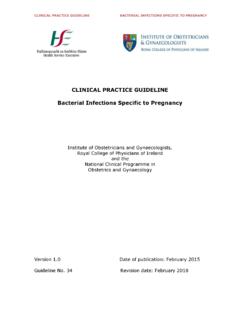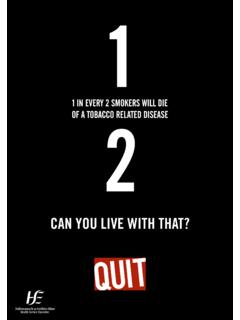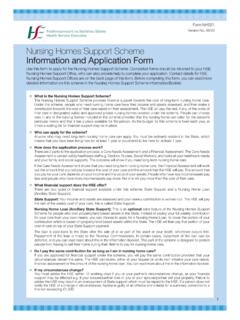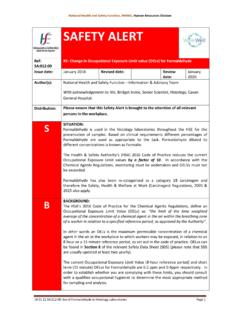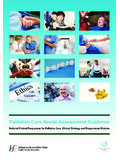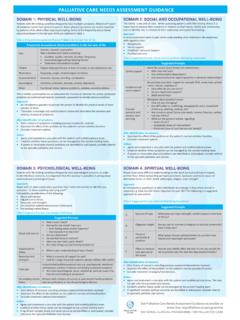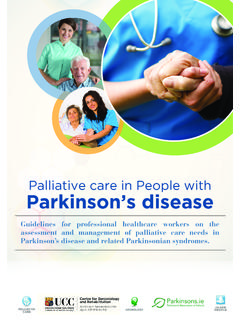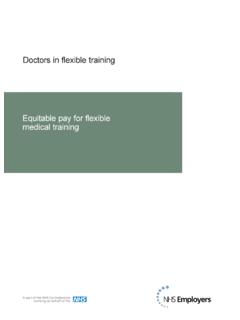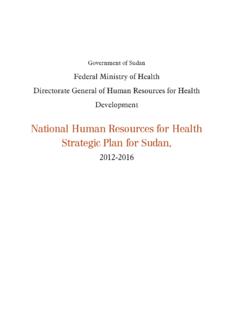Transcription of A National Model of Care for Paediatric Healthcare ...
1 A National Model of Care for Paediatric Healthcare Services in Ireland Chapter 39: Paediatric Palliative Care Clinical Strategy and Programmes Division National Clinical Programme for Paediatrics and Neonatology: A National Model of Care for Paediatric Healthcare Services in Ireland Table of Contents Introduction 2. Current Service Provision 4. Proposed Model of Care 9. Requirements for Successful Implementation of Model of Care 12. Programme Metrics and Evaluation 15. Governance 15. Key Recommendations 16. Abbreviations and Acronyms 16. References 17. Appendices 19. 1. National Clinical Programme for Paediatrics and Neonatology: A National Model of Care for Paediatric Healthcare Services in Ireland Introduction Palliative care for children and young people with life limiting conditions is an active and total approach to care, from the point of diagnosis or recognition throughout the child's life, death and beyond.
2 It embraces physical, emotional, social and spiritual elements and focuses on enhancement of quality of life for the child/young person and support for the family. It includes the management of distressing symptoms, provision of short breaks and care through death and bereavement (ACT & RCPCH 2009). Paediatric palliative care (PPC) is care which focuses on the relief of suffering in the child and family by controlling pain and other distressing symptoms, by integrating the psychological and spiritual aspects of care, by offering a support system to allow children and their families to live as active and full a life as possible and by supporting families to help them cope into bereavement. It is an important aspect of medical care for all children with a life limiting condition (LLC) or a life threatening condition or who need end-of-life care.
3 The challenges which must be faced when caring for a child with a LLC are multiple and specific, and differ significantly from those relating to the care of adults. Adolescents requiring palliative care have their own unique needs. As in adult palliative care services, the aim is to enable every child with a life limiting illness to live as well as possible until he/she dies. End of life care is only a small, although important part of what palliative care is. PPC. principles include neither hastening nor postponing death, helping change the focus of care from cure to quality of life (QOL) and weighing the burden versus benefit in all treatments offered. As PPC is a philosophy of care it can happen in any location the child is being cared for.
4 All Healthcare professionals involved in the care of children/young adults living with a LLC need to have an understanding of the core principles of PPC and to be able to adopt them appropriately. Any child with a LLC. may have palliative care needs which are usually met by the primary team caring for the child. Therefore not all children with palliative care needs will require specialist palliative care input. The role of the specialist PPC. service (SPPC) is to provide expert advice and support in more complex cases for the multidisciplinary teams (MDTs) already caring for these children and also to provide direct support to the child and family as appropriate. Life Limiting Conditions The term life limiting condition refers to any illness for which there is no reasonable hope of cure and where the child is unlikely to survive beyond early adulthood.
5 Many of these conditions cause a progressive deterioration leaving the child increasingly dependent on their family or carers. Such illnesses have been categorised into four categories (Fraser et al, 2012): Group 1. Life-threatening conditions for which curative treatment may be feasible but can fail. Access to palliative care services may be necessary when treatment fails. Children in long-term remission or following successful curative treatment are not included. Examples: cancer, irreversible organ failures of heart, liver, kidney. Group 2. Conditions where premature death is inevitable, where there may be long periods of intensive treatment aimed at prolonging life and allowing participation in normal activities.
6 Example: cystic fibrosis. 2. National Clinical Programme for Paediatrics and Neonatology: A National Model of Care for Paediatric Healthcare Services in Ireland Group 3. Progressive conditions without curative treatment options, where treatment is exclusively palliative and may commonly extend over many years. Examples: Batten disease, mucopolysaccharidoses, muscular dystrophy. Group 4. Irreversible but non-progressive conditions causing severe disability leading to susceptibility to health complications and likelihood of premature death. Examples: severe cerebral palsy, multiple disabilities such as following brain or spinal cord insult (ACT & RCPCH 2003). In Ireland approximately 370 children die each year with LLCs.
7 Of these deaths, 57% occur in the first year of life (DoHC, 2005). In keeping with international experience, it has been more difficult to establish accurate prevalence figures for children with LLCs. Initial estimates of a prevalence rate of 12 children per 10,000 meant that there were approximately 1,400 children living with a life-limiting condition. As predicted, this is believed to be a gross under-estimate based on recent updated UK figures of 32 per 10,000 population, almost three times the previously reported estimates (Fraser et al, 2012). Irish experts have recently recommended review of the National policy based on these higher figures (ref IMJ letter, March 2015). Expert opinion states that approximately half of the children identified with a LLC have palliative care needs at any one time (ACT, 2007).
8 It is important to note that in contrast to adult palliative care, children with cancer constitute a minority of those referred to palliative care services. Internationally, malignancies constitute only approx 22% of referrals to PPC, with diseases of the nervous system ( ), congenital conditions or illnesses originating in the perinatal period ( ) or other illnesses ( ) making up the majority (Widger et al, 2007). Referrals are likely to increase as the care of children with complex disability improves. Many children with exceptional Healthcare needs are surviving for many years and are most appropriately cared for by general paediatricians who are appropriately trained to meet their medical needs. They may have periods of relative stable health interspersed with periods of acute life- threatening illness when palliative care needs may be significant.
9 International experience Internationally, Paediatric palliative care has evolved from the specialty of paediatrics rather than adult palliative care. This is in keeping with the United Nations Convention on the Rights of the Child which insists that those working with children should first and foremost be trained in the care of children and young people. Irish palliative care policy also recommends that ideally staff trained in paediatrics should care for children with life- limiting conditions. In the Irish setting the support and input of adult palliative care services will continue to be relied upon to ensure children with LLCs are cared for as close to home as possible and can die at home if that is the wish of them or their families.
10 The United Kingdom (UK) has been to the forefront in the development of Paediatric palliative care services and in the recognition of Paediatric palliative medicine as a specialty. In the UK, palliative care services specifically for children have developed, initially from Paediatric oncology services, and more recently as palliative care teams in their own right. Together for Short lives (initially called The Association for Children with Life-threatening or Terminal Conditions and their Families or ACT), and the Royal College of Paediatrics and Child Health (RCPCH). in the UK, have been instrumental in producing several key documents regarding the palliative care needs of children. These include key recommendations for the care of children with life-limiting conditions.
